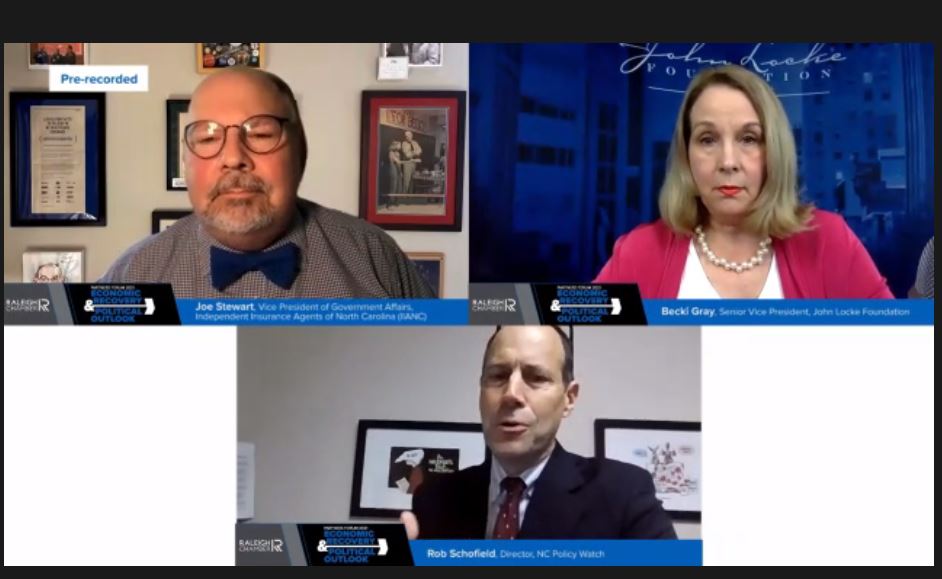|
What’s happening in the North Carolina General Assembly and around state government? Here’s a recap of activity and how your business may be impacted.
Last week, the North Carolina Senate laid out its 2021 Senate budget. This proposed budget focuses on finance and spending for North Carolina. Under the proposed budget, state employees including teachers and UNC system and community college employees would receive a 3 percent raise over the next two years. The budget also includes tax provisions found in House Bill 334. Additionally, the proposed budget includes a $5 billion rainy day fund for any natural disasters or occurrences. The budget would spend $25.7 billion in 2021-22 and $26.6billion in 2022-23 and $4.3billion will be allocated to the State Capital Infrastructure fund over the next two years. The House begins their budget negotiations this week and ultimately a conference committee will be appointed to resolve the differences between the two chambers before the bill goes to the Governor for his consideration. House Bill 680: Reenact Qualified Business Venture Credit also saw movement this week. The bill provides income tax credits for qualified business investments that are headquartered in a tier one or two county; or are in an opportunity zone. Additionally, the legislation increases the total amount of tax credits in a calendar year to $10 million (up from $7.5 million). The bill would become effective on Jan. 1 and contains an expiration date of Jan. 1, 2025. As of June 22, the bill was re-referred to the House Committee on Rules, Calendar, and Operations. The PCS for HB 680 maintains the former law's credit amount that was equal to 25% of investment with a maximum of $50,000 per individual. However, the PCS increases the statewide maximum to $10 million per year and increases the credit by 10 percent of the credit if the investment is a diversity business. The following types of investments are defined as qualified business:
Governor Cooper issued Executive Order No. 216, which reinstated work search requirements for individuals receiving unemployment insurance. One proposal debated by the General Assembly that offered additional incentives for returning to work was Senate Bill 116: Putting North Carolina Back to Work Act . Senate Bill 116 would end the extra $300 weekly benefit payments to unemployed insurance claimants through September 6, 2021. Common ground was not met at the General Assembly. A conference report was filed to resolve the differences between the Senate and the House of Representatives on Senate Bill 116. The conference report has been adopted and is headed to the Governor’s office. To learn more about our GA priorities, track legislative bills, or to read our blog posts, you can visit our webpage or follow us on Twitter @RcgaJ, @tierra_rcga, or @raleighchamber.
0 Comments
On June 24, the Raleigh Chamber Government Affairs department hosted its final virtual event. The Partners Forum: Economic Recovery & Political Outlook included remarks from well-known speakers including Tom Barkin, president and CEO of the US Federal Reserve Bank of Richmond and Neil Bradley, executive vice president, chief policy officer and head of strategic advocacy at the U.S. Chamber of Commerce. The panel included Becki Gray, senior vice president of the John Locke Foundation, Rob Schofield, director of NC Policy Watch, and Joe Stewart, vice president of government affairs for the independent Insurance Agents of North Carolina. Tom Barkin focused his talking points on on inflation and how the economy has struggled as a result of the pandemic. He discussed how behaviors during the pandemic, such as lack of spending, isolation, supply chain demands, and the closing of businesses resulted in the rise and fall of inflation over the past year. He believes we are in a temporary adjustment cycle, in which workers will return to the workplace, children will return to schools and fiscal payments will eventually retire. He projected our near term inflation pressure to ease as we go into the fourth quarter. Tom’s remarks were followed with by a discussion with our president and CEO, Adrienne Cole. Tom and Adrienne discussed job security, wage disparities, workforce development, and talent pipelines.  Neil Bradley gave his insight on today’s economy from a public policy perspective. He focused on congressional issues stemming directly from Capitol Hill such as; workforce shortage, right-sizing unemployment benefits, immigration, and federal spending. Neil stated that he believed our 2022 economy would be stronger than ever as a result of the “Great Resurgence”. The panel discussed top legislative issues affecting our state. Our panelists addressed North Carolina’s current state on government spending, education access, healthcare access, and workforce development. Make sure to save-the-date for our next event - the State of the City, County & Schools on July 22. This in-person event will be a great opportunity to hear priorities and policies from the following representatives: Mayor of the City of Raleigh, Chair of the Wake County Board of Commissioners, and Chair of the Wake County Board of Education.
You can register on our website. We hope to see you on July 22 at 11:30 a.m. We have some great events coming up! Make plans now so you can join us in-person at the following events:
State of the City, County & Schools is your chance to hear from our local leaders as they discuss the state of Raleigh, Wake County, and Wake County Schools. Our speakers are:
Register here. Diversity, Equity & Inclusivity Conference in partnership with Bank of America is a two-day virtual conference with the theme of, Speak Up, Take Action. Conference attendees will explore topics from different focal points over the two-day conference. You’ll hear from a number of powerful local speakers and hear from two global leaders in DEI.
Register here. Our Annual Meeting presented by Wells Fargo will include an overview of the Chamber’s accomplishments for the year, installation of the new chair of the Board of Directors, presentation of the A.E. Finley Distinguished Service Award, and a keynote presentation by Lynn Good, chair, president and CEO of Duke Energy. The event will take place Tuesday, September 14 from 3-5 p.m. Register here. Raleigh Chamber/CPI Security First Responders Appreciation Breakfast is our annual celebration of first responders. This event welcomes the business community to attend and show how much we appreciate those who risk their lives to save others. Representatives from the following departments plan to attend:
This event will be on Friday, September 24 from 7:30-9:30 a.m. Register here. We invite you to join us for these upcoming events. What’s happening in the North Carolina General Assembly and around state government? Here’s a recap of activity and how your business will be impacted.
Important discussions began last week around House Bill 951, a major piece of legislation designed to modernize our energy infrastructure and ensure that North Carolina has clean, reliable, and affordable energy generation. House Bill 951: Modernizing Energy Generation, is sound energy policy that moves our community forward in a multitude of ways. The bill strengthens existing customer-facing solar programs like Green Source Advantage, which businesses look to support sustainability goals and help reduce the carbon footprint. The bill also supports balanced energy transition in North Carolina at a pace that ensures continued reliability and affordability that businesses depend on. The bill is a product of a lengthy stakeholder group that has been occurring over the past several months. While there will certainly be numerous changes as the legislation moves through the legislative process, we are hopeful that discussions will continue, and the General Assembly will address this vital issue for the future of our economy. The economic development efforts of our region benefit when there is an “All of the Above” energy strategy in place. We will continue to update you as the legislation moves forward. For the past few months, the North Carolina General Assembly has been working to update North Carolina Labor Laws. Senate Bill 208: Labor Law Changes would do all of the following:
The bill passed the Senate and is now being debated in the House. We will monitor the legislation as it moves forward so business leaders are aware of any significant changes to North Carolina Labor Laws. To learn more about our GA priorities, track legislative bills, or to read our blog posts, you can visit our webpage or follow us on Twitter @RcgaJ, @tierra_rcga, or @raleighchamber. What’s happening in the North Carolina General Assembly and around state government? Here’s a recap of activity and how your business will be impacted.
Here’s an update on House Bill 334: Temp Align PPP Treatment to Federal Treatment. This bill would allow individuals and corporate taxpayers an income tax deduction for expenses paid using a loan forgiven under the Paycheck Protection Program. The Senate PCS for HB 334 replaces its contents with the JOBS Grant Program and Tax Changes for 2021. The Senate PCS for House Bill 334 has four parts.
The Senate substitute for HB 334 passed the Senate and awaits a concurrence vote in the House. If the House does not concur with the Senate proposal, a conference committee will be appointed to negotiate the differences between the two approaches to PPP forgiveness and tax policy. Another notable piece of legislation that made its way through the General Assembly last week was Senate Bill 722: Revise Municipal Redistricting/ Census. Senate Bill 722, as passed by the House, would delay the Raleigh municipal elections from October 2021 to November 2022 and move future Raleigh municipal elections to even numbered years. Additionally, the House proposal changes the election to one of non-partisan plurality, meaning that candidates will not run under a traditional party ballot and the runoff requirement would be eliminated. The terms of the officers currently serving on Raleigh City Council would be extended until November 2022 or his/her successor is elected and qualified in 2022. It is important to note that the original version of SB 722 passed by the Senate would have moved all municipal elections to March of 2022 and did not make exceptions for individual municipalities. We will continue to monitor and keep you apprised of its progress. Particularly as it relates to partnership on future bond proposals. To learn more about our GA priorities, track legislative bills, or to read our blog posts, you can visit our webpage or follow us on Twitter @RcgaJ, @tierra_rcga, or @raleighchamber. Developing leaders is important to the future success of the Triangle region. The Raleigh Chamber is leading the efforts to attract a highly skilled workforce and to develop your company’s future leaders. For the last 50 years, Leadership Raleigh has been the premier program for preparing the leaders of tomorrow.
The ten-month program has consistently provided participants with an in-depth view of community issues, a unique opportunity to interact and discuss issues with regional business and community leaders, and apply their talents by joining professional associations, civic clubs, public boards, and commissions. Leadership Raleigh participants are exposed to monthly sessions on a variety of issues, challenges, and opportunities. Monthly session topics include:
Applications are now open for Leadership Raleigh classes 43 and 44. The deadline to apply is July 16 by 5 p.m. Applications, program calendar, and more information are available online at www.leadershipraleigh.org. To hear more about the program directly from alumni, we invite you to register for our next Leadership Raleigh Information Session on June 10 starting at 8:30 a.m. For more information regarding Leadership Raleigh, email Chauncey Bowden or call 919.664.7036. The Phil Freelon Diversity, Equity, and Inclusivity Award is a new award given to an individual in the regional business community who has demonstrated an emerging or sustained commitment to champion change and positive impact in diversity, equity, and inclusivity.
The award will be given on the second day of the Conference on August 26. Philip Freelon had an indelible mark on the practice of architecture and his legacy transcends the brick and mortar of the buildings he designed. Freelon was a pioneer, a fierce advocate of diversity, equity, and inclusivity (DEI), and his impact will only strengthen over time as we continue to see the positive impact DEI has on business and the greater community. Freelon is a much-admired, award-winning architect and founded his practice, The Freelon Group, in Durham, North Carolina, in 1990. Freelon went on to design civic and cultural projects throughout the United States—libraries, schools, museums, parks, and academic buildings, notably for a number of historically African American colleges. His best-known works include the National Museum of African American History and Culture in Washington, DC; the National Center for Civil and Human Rights in Atlanta; the Harvey B. Gantt Center in Charlotte, North Carolina; the Museum of the African Diaspora in San Francisco; Emancipation Park in Houston; and the Mississippi Civil Rights Museum in Jackson. From inclusive leadership to building employee resource groups, the Phil Freelon Diversity, Equity, and Inclusivity Award seeks to highlight the collective work of individuals whose commitment to DEI is changing the landscape of our business community. You can now submit your nomination for individuals on our website. Nominations are due by July 15, 5 p.m. You can register for our virtual Diversity, Equity & Inclusivity Conference in partnership with Bank of America on our website. What’s happening in the North Carolina General Assembly and around state government? Here’s a recap of activity and how your business may be impacted.
There has been lots of activity in recent weeks around encouraging unemployed individuals to return to the workforce. As the American economy begins to rebound from an unprecedented year of pandemic related hardship, we must rebuild the workforce to meet the job demands of an emerging economy. In recent weeks, we saw an executive order from Governor Cooper that reinstated work search requirements for individuals receiving unemployment insurance. Many of those requirements were waived in 2020. Additionally, we saw two proposals debated in the General Assembly that offer additional incentives for returning to work. Please see below: Senate Bill 116: Putting North Carolina Back to Work Act. The Proposed Committee Substitute to SB 116 would do the following:
It is important to note that there is an additional effort being discussed in the House that would provide up to $250 million in childcare supplements for individuals receiving unemployment benefits as they re-enter the workforce. Additionally, the Senate passed a Proposed Committee Substitute for House Bill 128: An Act to Reemploy NC’s Workforce. The bill suggests several changes to the unemployment laws of North Carolina, including a provision that directs the Division of Employment Security to seek approval from the U.S. Department of Labor to use the $300 per week supplement authorized under the FPUC program as a signing bonus for unemployed claimants receiving benefits who accept reemployment. The signing bonus would be payable as follows:
The bill also reinstates numerous job search requirements that mirror Governor Cooper’s executive order, along with establishing disqualifying factors for any remaining employment insurance benefits. Millions of North Carolinians lost their jobs during the pandemic and relied heavily on unemployment benefits. However, as we are phasing out of the pandemic, local and state governments are working to get North Carolinians employed. To learn more about our GA priorities, track legislative bills, or to read our blog posts, you can visit our webpage or follow us on Twitter @RcgaJ, @tierra_rcga, or @raleighchamber. It’s CPR Awareness week and we are sharing ways that you can help save a life at home, in public, or at work.
As an employer or employee, here are some action steps you can take to be ready in the event someone needs CPR:
Be sure to follow and share content this week: @AmericanHeartNC @raleighchamber What’s happening in the North Carolina General Assembly? Here’s a recap of bill activity and how these bills may impact your business.
Last week, House Bill 947: The G.R.E.A.T Broadband Expansion Act was passed by the House with a vote of 109-0. The bill is now in the Senate for further review. Broadband expansion has been on the forefront of North Carolina’s list of priorities for several years and the need for affordable access has exacerbated since the COVID-19 pandemic. Numerous counties in the state do not have complete access to broadband and/or users cannot afford access to broadband. This leaves students without the ability to engage in virtual learning or access virtual resources during the school year. HB 947 proposes to make an additional $400 million allocation to assist counties with access to affordable broadband service upon participating in the Completing Access Broadband Program (CAB). Additionally, here is an update for House Bill 334: JOBS Grants and Tax Relief. Initially, HB 334 allowed individuals and corporate taxpayers an income tax deduction for expenses paid using a loan forgiven under the Paycheck Protection Program. The Senate PCS for HB 334 would replace its contents with the JOBS Grant Program and Tax Changes for 2021. The Senate PCS for House Bill 334 has four parts. JOBS Grant Program
IRC Update and Related Changes
Revenue Laws Study Committee Recommendations
HB 334 passed the Commerce and Insurance Committee, passed the Appropriations/Base Budget Committee and is currently with the Senate Rules and Operations Committee. To learn more about our GA priorities, track legislative bills, or to read our blog posts, you can visit our webpage or follow us on Twitter @RcgaJ, @tierra_rcga, or @raleighchamber. |
AuthorGreater Raleigh Chamber of Commerce Archives
July 2024
Categories
All
|
|
Greater Raleigh Chamber of Commerce
800 S. Salisbury St. Raleigh, NC 27601 |







 RSS Feed
RSS Feed